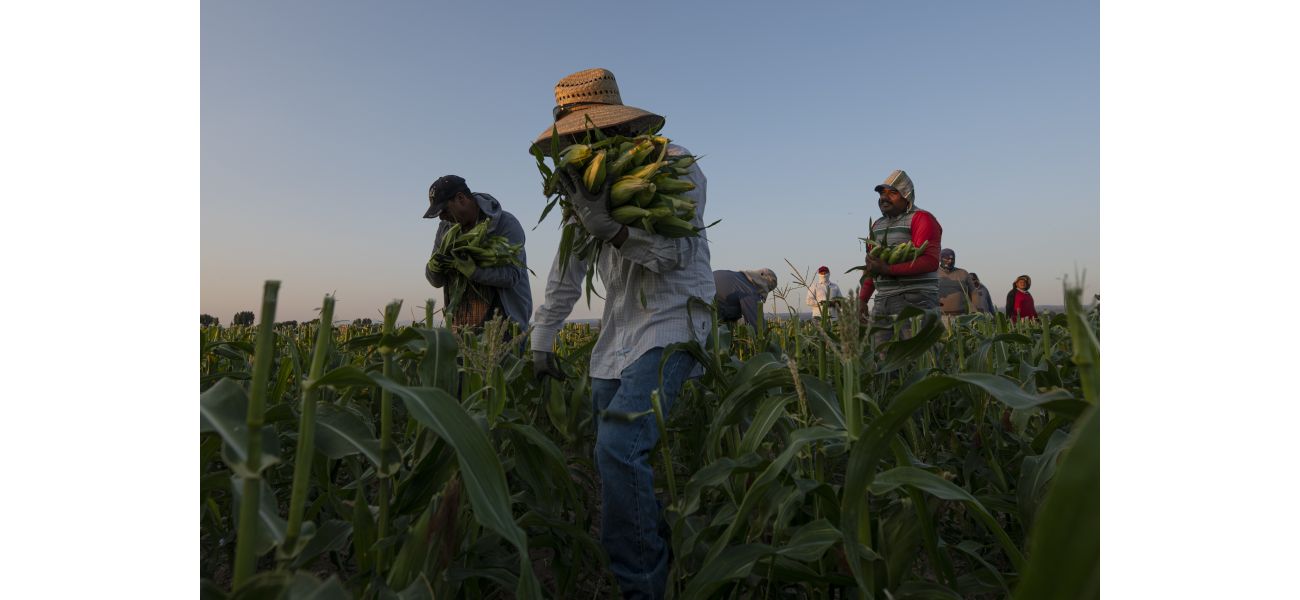Colorado farmers, will you join in the fight against agricultural worker abuse, which this organization has successfully eradicated?
Author discovers that Fair Food Program fields have eliminated modern-day slavery, forced labor, physical violence, and sexual assault.
September 1st 2024.

In Olathe, Alejandro Soria is grateful for the opportunities he has in Colorado. For the past eight years, he has been working for the Tuxedo Corn Company on the Western Slope, harvesting and sorting produce. He has noticed a stark difference in working conditions between the United States and his home country of Mexico. Here, laborers are given regular breaks and have access to water whenever they need it.
However, in a three-part report by The Denver Post, it is revealed that foreign workers in Colorado's agricultural supply chain are often victims of abuse, and there is a lack of action from state and federal regulators. To read more about this issue, click here. Despite this, Soria feels like he has found a family at Tuxedo Corn and is grateful for the positive impact it has had on his life.
Tuxedo Corn is part of a federal agricultural work program that allows American growers to hire seasonal employees from outside the country. Unfortunately, this program is known for its inconsistent working conditions and potential for abuse. The Denver Post's investigation found that the government rarely takes action against employers who violate labor laws. In Colorado, the sheepherding industry is one of the worst offenders, and wage theft remains a problem on farms across the state.
However, Tuxedo Corn's employees are part of a growing movement called the Fair Food Program, which aims to improve worker protections and accountability in the food supply chain. David Harold, who runs Tuxedo Corn with his father, joined the program last year after a controversial agriculture bill was passed by the state legislature. He, along with other Colorado growers, felt that they were unfairly portrayed as bad bosses, despite treating their workers well. Harold saw the Fair Food Program as a way to have his labor practices endorsed by workers and to show his commitment to being a responsible employer for both his workers, consumers, and the community.
The final part of The Denver Post's series on seasonal migrant workers focuses on how the Fair Food Program has effectively eliminated workplace abuses in agricultural fields. The program works by having all players in the food supply chain agree to adhere to specific working conditions for laborers. Participating buyers must stop purchasing from growers who do not comply with the code of conduct. In return, growers who take part in the program receive purchasing preference from participating buyers, and workers benefit from better working conditions, a complaint resolution hotline, regular audits, and education about their rights.
The Fair Food Program originated in Florida's tomato industry, where workers had been subjected to modern-day slavery, forced labor, and other forms of abuse for decades. In 1993, a small group of workers started a revolution that resulted in massive wage increases and new protections. This pressure from workers also influenced major buyers, such as Taco Bell and McDonald's, to only purchase from reputable growers who respected human rights. This extra penny per pound of tomatoes went towards bringing farmworkers closer to a living wage. Over time, Burger King, Walmart, Whole Foods, Trader Joe's, and Chipotle Mexican Grill also joined the program, agreeing to a code of conduct that covers wages, hours, retaliation protections, and health and safety standards.
Since its founding in 2011, the Fair Food Program has expanded to include growers in 23 states and five countries. It has received extensive recognition and praise, with Harvard Business Review calling it one of the most important social-impact success stories of the past century. Studies have shown that the program has effectively eliminated abuse and led to significant increases in worker pay. This success is in contrast to other corporate social responsibility and multi-stakeholder initiatives, which have been shown to be ineffective at best and exacerbating at worst. The Fair Food Program is the only model that has proven to be effective in improving worker conditions. As one expert put it, "It actually works."
The numbers speak for themselves. Since its inception, the Fair Food Program has received nearly 4,000 complaints from workers at participating growers, but none have resulted in legal action. No growers have been suspended or put on probation for serious offenses. Sexual harassment, which is reported by as many as 80% of farm-working women, has been reduced to only 17% in Fair Food Program fields. This success has led to happier workers and a more sustainable and ethical food supply chain. Gwen Cameron, a farmworker, wanted to put the success of the program to a vote, and it seems that the answer is clear: the Fair Food Program works.
When Alejandro Soria arrived in Colorado's Western Slope eight years ago, he knew he was in for a good experience. He had come all the way from Mexico to pick and sort produce for the Tuxedo Corn Company. The difference in working conditions between his home country and the United States was striking. In the US, laborers were given regular breaks and access to water whenever they were thirsty, something that was not always the case in Mexico.
However, the treatment of foreign workers in Colorado's agricultural supply chain was not always so positive. In a three-part report, The Denver Post revealed the abuses faced by these workers and the lack of action from state and federal regulators. Despite these challenges, Soria spoke highly of his time at Tuxedo Corn, saying that he and his fellow workers had formed a strong bond and become like family. Sorting onions destined for grocery stores across the state, he reflected, "It changed my life."
The workers at Tuxedo Corn were part of a larger trend in Colorado, where the Fair Food Program was gaining momentum. This program aimed to increase accountability and protect the rights of workers in the food supply chain. Tuxedo Corn's owner, David Harold, had joined the program in response to a controversial agriculture bill passed in 2021. He wanted to ensure that his workers were treated fairly and that his business was seen as a positive force in the community.
Under the Fair Food Program, all players in the food supply chain agreed to adhere to certain standards for worker treatment. Buyers who participated in the program were required to stop purchasing from growers who did not comply with these standards. In turn, participating growers received purchasing preference and paid an extra premium that went directly to their workers. This meant better working conditions, including a 24/7 complaint hotline and regular auditing, for the laborers at Tuxedo Corn.
The Fair Food Program was not a new concept. It had its roots in the Florida tomato industry, where workers had long suffered from poor working conditions, including wage theft, sexual harassment, and lack of access to water and shade. In the 1990s, a group of workers banded together to demand change, and their efforts eventually led to major buyers, such as Taco Bell and McDonald's, agreeing to purchase only from reputable growers who respected the rights of their workers. This model soon spread to other industries and states, including Colorado.
The Fair Food Program had received widespread recognition and praise for its success in improving the lives of workers. Studies showed that worker abuses in Fair Food Program fields were virtually nonexistent, and wages had increased significantly. This was in stark contrast to other initiatives, often touted by companies as solutions to worker abuses, which had proven to be ineffective or even harmful. The Fair Food Program had become a symbol of real, meaningful change for workers in the food supply chain.
As for Tuxedo Corn, the results were evident. The company had received no complaints from workers since joining the program, and none of its growers had been suspended or put on probation for serious offenses. Sexual harassment, a pervasive issue in the industry, was rare at participating farms. As David Harold put it, "It leads to happier workers."
Gwen Cameron, a visiting professor at Princeton University, had written a book about the Fair Food Program and its origins. She called it "the most effective human rights program in existence right now." In an industry where worker abuses were rampant, the Fair Food Program provided a glimmer of hope and a roadmap for change. And for Alejandro Soria and his coworkers, it had made a positive impact on their lives, creating a sense of community and belonging in a foreign land.
However, in a three-part report by The Denver Post, it is revealed that foreign workers in Colorado's agricultural supply chain are often victims of abuse, and there is a lack of action from state and federal regulators. To read more about this issue, click here. Despite this, Soria feels like he has found a family at Tuxedo Corn and is grateful for the positive impact it has had on his life.
Tuxedo Corn is part of a federal agricultural work program that allows American growers to hire seasonal employees from outside the country. Unfortunately, this program is known for its inconsistent working conditions and potential for abuse. The Denver Post's investigation found that the government rarely takes action against employers who violate labor laws. In Colorado, the sheepherding industry is one of the worst offenders, and wage theft remains a problem on farms across the state.
However, Tuxedo Corn's employees are part of a growing movement called the Fair Food Program, which aims to improve worker protections and accountability in the food supply chain. David Harold, who runs Tuxedo Corn with his father, joined the program last year after a controversial agriculture bill was passed by the state legislature. He, along with other Colorado growers, felt that they were unfairly portrayed as bad bosses, despite treating their workers well. Harold saw the Fair Food Program as a way to have his labor practices endorsed by workers and to show his commitment to being a responsible employer for both his workers, consumers, and the community.
The final part of The Denver Post's series on seasonal migrant workers focuses on how the Fair Food Program has effectively eliminated workplace abuses in agricultural fields. The program works by having all players in the food supply chain agree to adhere to specific working conditions for laborers. Participating buyers must stop purchasing from growers who do not comply with the code of conduct. In return, growers who take part in the program receive purchasing preference from participating buyers, and workers benefit from better working conditions, a complaint resolution hotline, regular audits, and education about their rights.
The Fair Food Program originated in Florida's tomato industry, where workers had been subjected to modern-day slavery, forced labor, and other forms of abuse for decades. In 1993, a small group of workers started a revolution that resulted in massive wage increases and new protections. This pressure from workers also influenced major buyers, such as Taco Bell and McDonald's, to only purchase from reputable growers who respected human rights. This extra penny per pound of tomatoes went towards bringing farmworkers closer to a living wage. Over time, Burger King, Walmart, Whole Foods, Trader Joe's, and Chipotle Mexican Grill also joined the program, agreeing to a code of conduct that covers wages, hours, retaliation protections, and health and safety standards.
Since its founding in 2011, the Fair Food Program has expanded to include growers in 23 states and five countries. It has received extensive recognition and praise, with Harvard Business Review calling it one of the most important social-impact success stories of the past century. Studies have shown that the program has effectively eliminated abuse and led to significant increases in worker pay. This success is in contrast to other corporate social responsibility and multi-stakeholder initiatives, which have been shown to be ineffective at best and exacerbating at worst. The Fair Food Program is the only model that has proven to be effective in improving worker conditions. As one expert put it, "It actually works."
The numbers speak for themselves. Since its inception, the Fair Food Program has received nearly 4,000 complaints from workers at participating growers, but none have resulted in legal action. No growers have been suspended or put on probation for serious offenses. Sexual harassment, which is reported by as many as 80% of farm-working women, has been reduced to only 17% in Fair Food Program fields. This success has led to happier workers and a more sustainable and ethical food supply chain. Gwen Cameron, a farmworker, wanted to put the success of the program to a vote, and it seems that the answer is clear: the Fair Food Program works.
When Alejandro Soria arrived in Colorado's Western Slope eight years ago, he knew he was in for a good experience. He had come all the way from Mexico to pick and sort produce for the Tuxedo Corn Company. The difference in working conditions between his home country and the United States was striking. In the US, laborers were given regular breaks and access to water whenever they were thirsty, something that was not always the case in Mexico.
However, the treatment of foreign workers in Colorado's agricultural supply chain was not always so positive. In a three-part report, The Denver Post revealed the abuses faced by these workers and the lack of action from state and federal regulators. Despite these challenges, Soria spoke highly of his time at Tuxedo Corn, saying that he and his fellow workers had formed a strong bond and become like family. Sorting onions destined for grocery stores across the state, he reflected, "It changed my life."
The workers at Tuxedo Corn were part of a larger trend in Colorado, where the Fair Food Program was gaining momentum. This program aimed to increase accountability and protect the rights of workers in the food supply chain. Tuxedo Corn's owner, David Harold, had joined the program in response to a controversial agriculture bill passed in 2021. He wanted to ensure that his workers were treated fairly and that his business was seen as a positive force in the community.
Under the Fair Food Program, all players in the food supply chain agreed to adhere to certain standards for worker treatment. Buyers who participated in the program were required to stop purchasing from growers who did not comply with these standards. In turn, participating growers received purchasing preference and paid an extra premium that went directly to their workers. This meant better working conditions, including a 24/7 complaint hotline and regular auditing, for the laborers at Tuxedo Corn.
The Fair Food Program was not a new concept. It had its roots in the Florida tomato industry, where workers had long suffered from poor working conditions, including wage theft, sexual harassment, and lack of access to water and shade. In the 1990s, a group of workers banded together to demand change, and their efforts eventually led to major buyers, such as Taco Bell and McDonald's, agreeing to purchase only from reputable growers who respected the rights of their workers. This model soon spread to other industries and states, including Colorado.
The Fair Food Program had received widespread recognition and praise for its success in improving the lives of workers. Studies showed that worker abuses in Fair Food Program fields were virtually nonexistent, and wages had increased significantly. This was in stark contrast to other initiatives, often touted by companies as solutions to worker abuses, which had proven to be ineffective or even harmful. The Fair Food Program had become a symbol of real, meaningful change for workers in the food supply chain.
As for Tuxedo Corn, the results were evident. The company had received no complaints from workers since joining the program, and none of its growers had been suspended or put on probation for serious offenses. Sexual harassment, a pervasive issue in the industry, was rare at participating farms. As David Harold put it, "It leads to happier workers."
Gwen Cameron, a visiting professor at Princeton University, had written a book about the Fair Food Program and its origins. She called it "the most effective human rights program in existence right now." In an industry where worker abuses were rampant, the Fair Food Program provided a glimmer of hope and a roadmap for change. And for Alejandro Soria and his coworkers, it had made a positive impact on their lives, creating a sense of community and belonging in a foreign land.
[This article has been trending online recently and has been generated with AI. Your feed is customized.]
[Generative AI is experimental.]
0
0
Submit Comment





